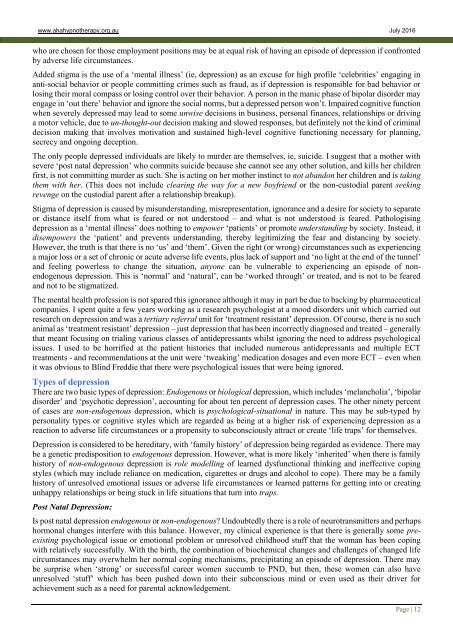The Australian Hypnotherapy Journal
296nlgS
296nlgS
You also want an ePaper? Increase the reach of your titles
YUMPU automatically turns print PDFs into web optimized ePapers that Google loves.
www.ahahypnotherapy.org.au July 2016<br />
who are chosen for those employment positions may be at equal risk of having an episode of depression if confronted<br />
by adverse life circumstances.<br />
Added stigma is the use of a ‘mental illness’ (ie, depression) as an excuse for high profile ‘celebrities’ engaging in<br />
anti-social behavior or people committing crimes such as fraud, as if depression is responsible for bad behavior or<br />
losing their moral compass or losing control over their behavior. A person in the manic phase of bipolar disorder may<br />
engage in ‘out there’ behavior and ignore the social norms, but a depressed person won’t. Impaired cognitive function<br />
when severely depressed may lead to some unwise decisions in business, personal finances, relationships or driving<br />
a motor vehicle, due to un-thought-out decision making and slowed responses, but definitely not the kind of criminal<br />
decision making that involves motivation and sustained high-level cognitive functioning necessary for planning,<br />
secrecy and ongoing deception.<br />
<strong>The</strong> only people depressed individuals are likely to murder are themselves, ie, suicide. I suggest that a mother with<br />
severe ‘post natal depression’ who commits suicide because she cannot see any other solution, and kills her children<br />
first, is not committing murder as such. She is acting on her mother instinct to not abandon her children and is taking<br />
them with her. (This does not include clearing the way for a new boyfriend or the non-custodial parent seeking<br />
revenge on the custodial parent after a relationship breakup).<br />
Stigma of depression is caused by misunderstanding, misrepresentation, ignorance and a desire for society to separate<br />
or distance itself from what is feared or not understood – and what is not understood is feared. Pathologising<br />
depression as a ‘mental illness’ does nothing to empower ‘patients’ or promote understanding by society. Instead, it<br />
disempowers the ‘patient’ and prevents understanding, thereby legitimizing the fear and distancing by society.<br />
However, the truth is that there is no ‘us’ and ‘them’. Given the right (or wrong) circumstances such as experiencing<br />
a major loss or a set of chronic or acute adverse life events, plus lack of support and ‘no light at the end of the tunnel’<br />
and feeling powerless to change the situation, anyone can be vulnerable to experiencing an episode of nonendogenous<br />
depression. This is ‘normal’ and ‘natural’, can be ‘worked through’ or treated, and is not to be feared<br />
and not to be stigmatized.<br />
<strong>The</strong> mental health profession is not spared this ignorance although it may in part be due to backing by pharmaceutical<br />
companies. I spent quite a few years working as a research psychologist at a mood disorders unit which carried out<br />
research on depression and was a tertiary referral unit for ‘treatment resistant’ depression. Of course, there is no such<br />
animal as ‘treatment resistant’ depression – just depression that has been incorrectly diagnosed and treated – generally<br />
that meant focusing on trialing various classes of antidepressants whilst ignoring the need to address psychological<br />
issues. I used to be horrified at the patient histories that included numerous antidepressants and multiple ECT<br />
treatments - and recommendations at the unit were ‘tweaking’ medication dosages and even more ECT – even when<br />
it was obvious to Blind Freddie that there were psychological issues that were being ignored.<br />
Types of depression<br />
<strong>The</strong>re are two basic types of depression: Endogenous or biological depression, which includes ‘melancholia’, ‘bipolar<br />
disorder’ and ‘psychotic depression’, accounting for about ten percent of depression cases. <strong>The</strong> other ninety percent<br />
of cases are non-endogenous depression, which is psychological-situational in nature. This may be sub-typed by<br />
personality types or cognitive styles which are regarded as being at a higher risk of experiencing depression as a<br />
reaction to adverse life circumstances or a propensity to subconsciously attract or create ‘life traps’ for themselves.<br />
Depression is considered to be hereditary, with ‘family history’ of depression being regarded as evidence. <strong>The</strong>re may<br />
be a genetic predisposition to endogenous depression. However, what is more likely ‘inherited’ when there is family<br />
history of non-endogenous depression is role modelling of learned dysfunctional thinking and ineffective coping<br />
styles (which may include reliance on medication, cigarettes or drugs and alcohol to cope). <strong>The</strong>re may be a family<br />
history of unresolved emotional issues or adverse life circumstances or learned patterns for getting into or creating<br />
unhappy relationships or being stuck in life situations that turn into traps.<br />
Post Natal Depression:<br />
Is post natal depression endogenous or non-endogenous? Undoubtedly there is a role of neurotransmitters and perhaps<br />
hormonal changes interfere with this balance. However, my clinical experience is that there is generally some preexisting<br />
psychological issue or emotional problem or unresolved childhood stuff that the woman has been coping<br />
with relatively successfully. With the birth, the combination of biochemical changes and challenges of changed life<br />
circumstances may overwhelm her normal coping mechanisms, precipitating an episode of depression. <strong>The</strong>re may<br />
be surprise when ‘strong’ or successful career women succumb to PND, but then, these women can also have<br />
unresolved ‘stuff’ which has been pushed down into their subconscious mind or even used as their driver for<br />
achievement such as a need for parental acknowledgement.<br />
Page | 12


